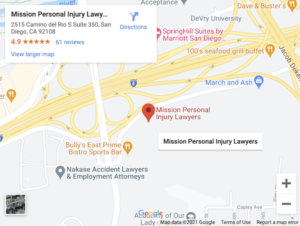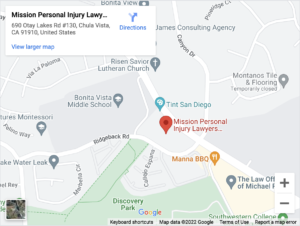
California’s personal injury laws allow individuals to seek compensation for damages caused by another person’s negligence or wrongdoing. For many individuals, a personal injury claim is the first legal matter they encounter.
Our experienced personal injury lawyers are available to help guide you through the process and protect your best interests and legal rights.
We understand that you might have questions about personal injury cases. Below are answers to common questions about personal injury claims.
Table of Contents
California Personal Injury FAQs
1. What is a Personal Injury Claim?
Personal injury covers a wide variety of situations and accidents that result in harm to another person. Personal injury claims are demands for compensation for damages sustained because of another person’s negligence, recklessness, or wrongdoing.
Examples of accidents that can result in a personal injury claim include, but are not limited to:
- Medical malpractice
- Car accidents
- Truck accidents
- Product liability claims (defective products)
- Premises liability claims (slip and fall accidents)
- Dog bites and animal attacks
- Bicycle accidents
- Motorcycle crashes
- Construction accidents
- Boating accidents
- Wrongful death
You have the burden of proving the legal elements of negligence to hold the at-fault parties personally liable for your damages. If you are unsure whether you have a personal injury claim, talk with an attorney as soon as possible.
2. How Long Do I Have to File a Personal Injury Claim in California?
The California Statute of Limitations sets deadlines for filing personal injury claims. If you fail to file a lawsuit before the time expires, you lose your right to pursue a claim in court. The judge will dismiss your lawsuit, even if the other party is clearly at fault for your injuries and damages.
In most cases, the deadline to file a personal injury lawsuit is two years from the date of the injury. However, there are exceptions to that deadline. For instance, a notice of claim against a government entity must be filed within six months of the date of injury, or you could lose your right to file a lawsuit.
There are also exceptions for medical malpractice cases and for cases involving injuries to minors. It is best to seek legal advice as soon as possible after an injury to avoid missing a deadline.
3. What Damages Can I Recover After an Accident or Injury?
Damages for a personal injury claim may include economic damages, non-economic damages, and punitive damages.
Economic damages are the financial losses and expenses you incur because of the accident or your injuries. Examples include lost wages, medical expenses, travel expenses, personal care costs, and help with household chores.
Non-economic damages are the “pain and suffering” you experience because of another party’s negligence. It includes the emotional, physical, and mental suffering you experience. It also includes scarring, disfigurement, and permanent impairments. You may also be entitled to compensation for a decrease in your quality of life or loss of enjoyment of life.
Punitive damages are not common in personal injury cases. Punitive damages “punish” the at-fault party for conduct that amounts to fraud, oppression, or malice.
You may also receive compensation for damage to personal property, as in a motor vehicle accident. However, a property damage claim is separate from a personal injury claim.
4. How Much Does It Cost to Hire a Personal Injury Lawyer?
Attorneys generally charge by the hour for their services. However, most personal injury lawyers accept cases on a contingency fee basis.
In a contingency agreement, you do not pay any attorneys’ fees until the lawyer recovers money for your claim. If the attorney does not recover any money for your claim, you do not pay them for their services.
The contingency fee is a percentage of your settlement or jury verdict. You and your lawyer negotiate the percentage when you hire them. Contingency fees are used in almost all types of accident or injury claims.
5. Who Pays My Medical Bills After an Accident?
You are responsible for the cost of medical care and treatment. However, you can recover reimbursement for medical costs when you settle your personal injury case.
The insurance company or at-fault party does not pay your medical bills as you incur them. However, you can file the medical bills with your health insurance company.
Your personal injury lawyer may be able to work with your physicians and medical providers to get them to agree to wait for payment until you recover compensation for your claim. Still, you are responsible for paying any medical bills not paid from your personal injury settlement.
6. Will I Need to Go to Trial for My Personal Injury Case?
Most personal injury cases settle without going to court. Our lawyers work diligently to obtain a settlement as quickly as possible. Still, we never hesitate to file a lawsuit if that is the best way to protect your right to fair and just compensation for damages.
7. How Much is My Personal Injury Case Worth?
The value of your personal injury claim depends on the facts of the case. Factors that could impact the value of your claim include:
- Whether you are partially responsible for the cause of the accident or your injury
- The type and severity of your injuries
- If you sustained a permanent impairment or disability
- Your total economic losses
- The availability of insurance coverage
- The parties involved in the case
- Whether liability for the cause of the accident is in dispute
An attorney cannot give you an exact figure for the value of your case. The lawyer needs to investigate the accident, gather evidence, and document damages. In some cases, they will need to hire medical experts and financial professionals to evaluate your damages and calculate your future losses.
8. What is a Settlement Agreement?
A settlement agreement is a legal contract that explains the terms of your settlement of a claim. The agreement releases all parties from any future claims.
Therefore, before you sign a settlement agreement, talk with a personal injury lawyer. Once you sign the settlement agreement, you cannot demand more money for your claim. If you discover additional damages, you are personally responsible for them since you released all parties from further liability.
9. What if I Am Partially to Blame for My Accident?
California’s pure contributory fault laws do not bar you from recovering money if you contributed to the accident. However, your compensation can be reduced by your percentage of fault for the accident and your injuries.
10. What Should I Do If an Insurance Adjuster Calls Me After an Accident?
It is not in your best interest to answer questions or make a written or recorded statement without consulting with an attorney. Likewise, you should not sign any documents until an attorney reviews the documents.
Adjusters protect the best interest of the insurance company. They work to reduce the insurance company’s liability for your claim. In other words, adjusters try to pay as little as possible for your claim.
It is best to allow an attorney to handle all communications, claims, and negotiations with the insurance company for the at-fault party.
Contact Our San Diego Personal Injury Lawyer for a Free Consultation
If you have questions about personal injury claims or want to discuss your case, contact our San Diego law offices or call us at (619) 777-5555 to schedule a free consultation with one of our attorneys at Mission Personal Injury Lawyers. During your initial consultation, we discuss how we can help you recover the money you deserve for your financial losses, injuries, suffering, and other damages.


